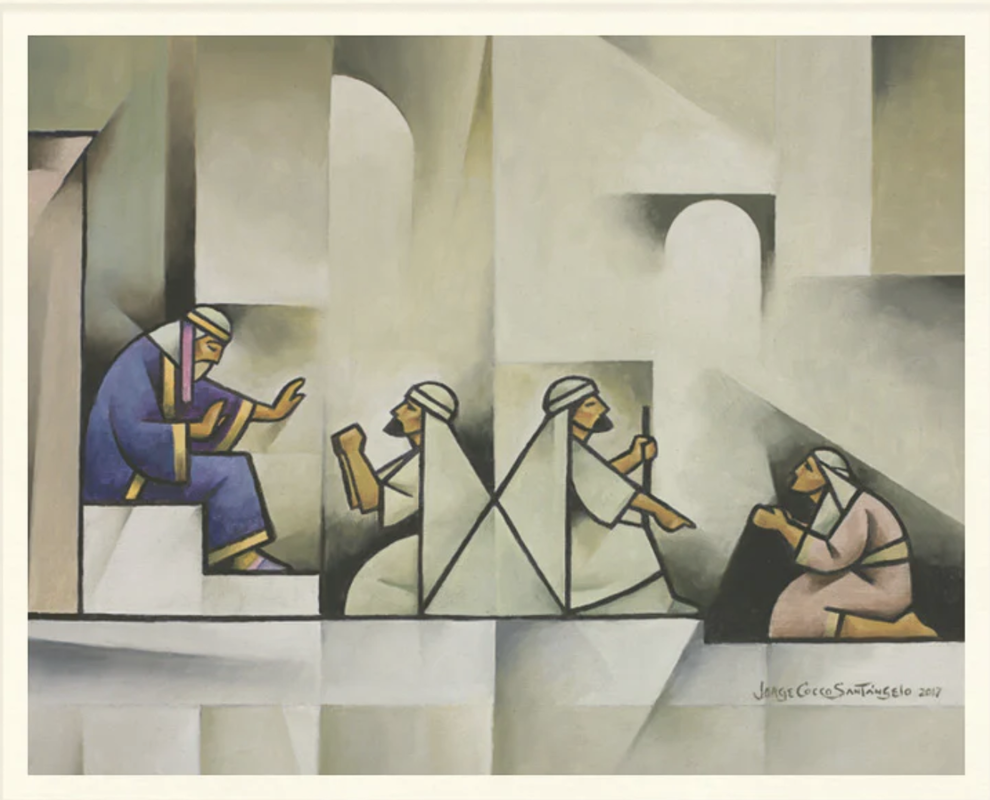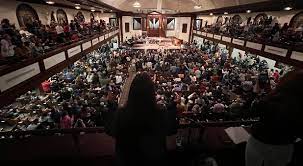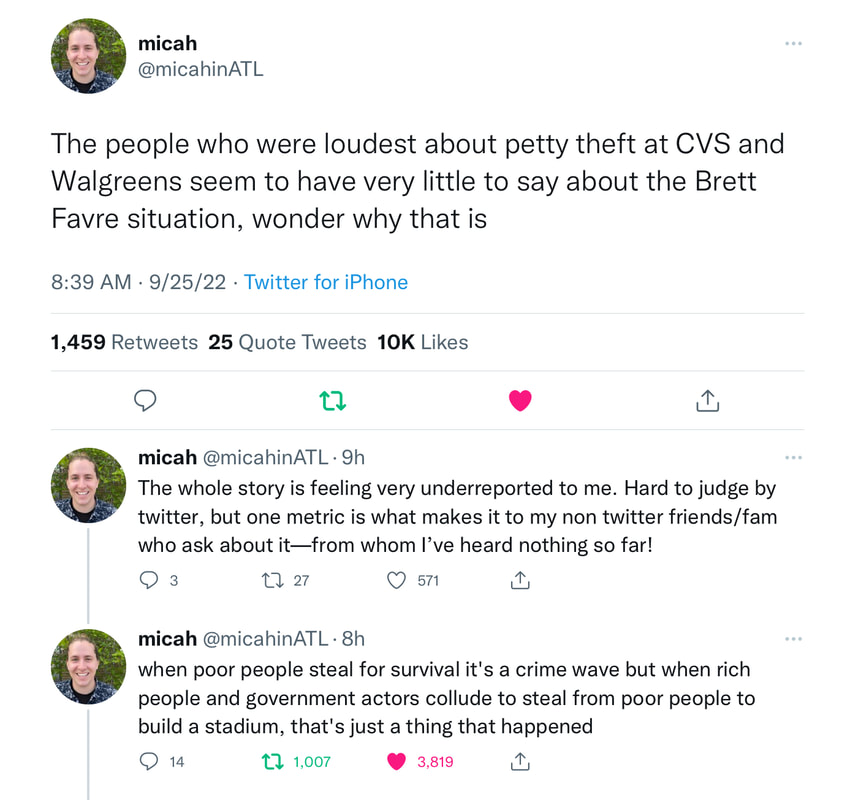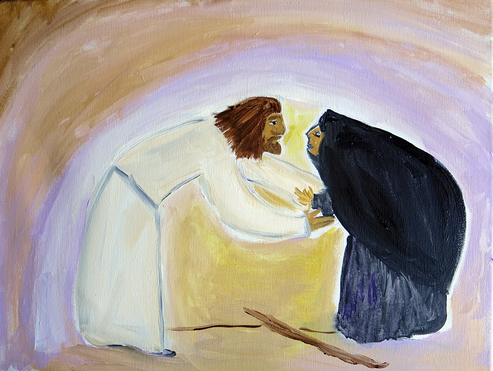Amy Courts
Written Things:
sermons, songs, etceteras
|
This sermon was originally preached on September 17, 2023 at Christ the River of Life Lutheran Church in North Minneapolis, MN. Gospel Text: Matthew 18:21-35 Good morning, friends, neighbors. My name is Amy Courts Koopman, my pronouns are she, her, hers, and as Pastor Kim wrote in today’s bulletin, this is the first church my family and I visited back in 2011 when we first moved to North Minneapolis. The years have taken me many places, including to Redeemer where I’ve worked the past five years, and next to Gethsemane Lutheran Church where I just accepted my first call. So this is a full-circle kind of moment for me, and I’m grateful to be here on this last Sunday before I officially start my first call.
Fair warning, I’m going to be spitting out a lot of numbers, but for good reason, I promise. So let’s look to Matthew 18:21-35, a parable about accountability and pardon, which goes something like this: An enslaved man is brought before his lord to settle a 10,000 Talent debt, and because he cannot pay it, his lord is going to sell him and his family and all their belongings. But the man begs for mercy. His lord is filled with compassion and releases him from massive debt. Literally, his debt is pardoned, the account is settled, and he is freed to leave. With his newfound freedom, this man goes to another enslaved person, violently grabs him by the throat and demands repayment of 100 Denarii. Like the first, this second now-choking person can’t repay his debt. And like the first, he begs for patience and mercy. But instead of pardoning this second debtor, the first throws him in prison til the debt can be repaid.
0 Comments
This sermon was originally preached on July 9, 2023 at Redeemer Lutheran Church in North Minneapolis, MN . The recorded service may be viewed here. Lectionary Texts: Psalm 145:8-14 | Matthew 11:16-19, 25-30 Good morning, church. Once again and as ever, I am grateful to be with you today and really glad I finally get to lead worship with Pastor Jen! I’ve filled in for her in the past when she’s been gone, but this week we are here together because I asked for the opportunity to preach and she said yes. Woo hoo! Not only that, but it happens to be good timing for me to take up this burden while Pastor Jen takes a deep, much deserved breath.
I’m also excited to be here preaching when Pastor Alissa is here, since she was one of the first people to welcome me back in 2016, and offer me a place of ease and rest at a moment in my life when I was ground down to dust and wanted nothing to do with church. She is also the one who invited me in the summer of 2017 to apply for the admin position. The rest, as they say, is history we are living, in this very moment. Lest you think I’m going on for no good reason, trust me for a moment and let’s go to today’s text, which is, at its end, all about the collaborative laying down and taking up of burdens. Our gospel begins at the end of a conversation between Jesus and the followers of currently-incarcerated John the Baptist who sent them to ask if the man who’s been healing people and calling his own disciples is still the One Who is To Come, or if they should look and wait for another. John, it seems, is weary and doubting if all his ministry had come to naught or if maybe he’d heralded the wrong guy.. . HUNGER | Matthew 21:18-223/27/2023
May we be met today as the blind men were on the road to Jerusalem, and our eyes opened; May we be filled today with food that nourishes and satisfies the hunger of our bodies, our minds, our spirits, through Jesus Christ who is all and is in all, Amen.
Good morning, Redeemer. It’s good to be with you again, last minute as it is while Pastor Jen is resting and recovering at home. I come to you frazzled and harried as my family navigates all kinds of potential changes to our lives in this first call journey. We often find ourselves with frayed nerves, doing our best to stay in the moment, but often failing. So this story about a cursed fig tree hits close to home. Which is funny, because on first read, it just seems weird, random, and out of place. In fact, when I saw this was today’s text I audibly sighed and sent an “oh no” text to Pastor Jen. It is -- no lie -- a passage that we joked about in Seminary. No one wants to preach about it because it’s like squeezing blood from a stone -- or like pulling figs from a tree that’s not yet in season to produce fruit. Not only that, but when I searched for wisdom from my go-to preacher's, like Dr Wil Gafney, Rev. Otis Moss, and Rev Traci Blackmon, they were quiet. It seems none of the progressive, womanist, or liberationist voices I follow find this passage particularly remarkable. Old conservative white men, on the other hand, have lots to say, mostly about judgment and performance and how we can tell “real” christians from fake ones who “bear leaves” but not fruit and whom, therefore, God will doom to everlasting withering, and while that’s all very interesting, it’s actually not. Not to me, anyway, and not today. How Long | Matthew 22:1-143/8/2023
This sermon was originally preached on March 8, 2023 at Augsburg University.
Scripture Texts: Jeremiah 6:13-20; 7:3-11 | Matthew 22:1-14
Good morning, Beloveds. Thank you, Pastors Hannah and Babette, for inviting me to be here today, and for your lovely introduction. I am honored to be with you all, and to explore together what it looks like to be God's people: that is, how to be people of Peace in an active, deliberate, and just way. I paired today's gospel lesson in Matthew 22 with the prophecy and Temple sermon to the people of Judah in Jeremiah 6 and 7. The two narratives may seem incongruous or mismatched, but I have come to see then as mirror images of each other, and mirrors for readers, cautioning us about the ways God's people are prone to behave when circumstances or Spirit challenge our assumptions and practices, and each offering a different, better way. So let's dive in.
In Jeremiah 6, we see the people of God on the verge of invasion and being warned by the prophet that for all their keeping of certain rules and regulations regarding Temple worship, they've utterly missed the mark and are on the verge of disaster: The oppressed have themselves become oppressive toward the vulnerable and careless with the wounded, declaring "peace peace when there is no peace!" They follow Laws of the Temple while defying the Law of Love toward others, and so their sacrifices and offerings turn to rot in God's nose. So Jeremiah gives them clear directions in the Temple Sermon of chapter 7, on how to avoid their own doom: Amend your ways! Do justice! Welcome foreigners! Take care of orphans and single mothers! And put an end to the violence -- THEN, he says, God will inhabit both God's people and God's place, and be blessed. But so long as they sow injustice and oppress the vulnerable, declaring peace when there is none, the destruction awaiting them will be the fruit of their own schemes.†Hold on to that as we move over into Matthew’s Parable of the Wedding Feast. The Asbury Revival?2/16/2023
Firstly, many Disabled, Queer, Black, and other Non-Black People of Color and marginalized identities have already underscored the oddities of a “revival” or “awakening” that excludes bodies and experiences like theirs from the physical and spiritual location of the event. Alicia Crosby Mack said on Twitter, “A mass unmasked event in a pandemic that’s racially & culturally homogenous is not a revival. …We cannot speak about an event being a revival when the most vulnerable among us are excluded & at minimum the lack of covid safety precautions render this place unsafe. The Scriptures teach that where the Spirit of God is, there is freedom. If we hold that to be true, how can a revival in which this Spirit is present take place when disabled & medically vulnerable people are not free to engage without significant risk of harm? …If their Imago Dei is excluded what exactly is being revived?”
Plenty of disabled people have underscored similar issues with this hyper-located “revival” that will undoubtedly act as much as a superspreader event as anything else. So it is hard (okay, impossible) to affirm the idea that this is a true movement of the Holy Spirit when it is at best excluding oppressed people and at worst placing them at increased risk of illness and death. Secondly, I’m moved by what Zach Hunt noted yesterday: “Why is [it] that ‘revival’ and a ‘sudden outpouring of the Holy Spirit’ are only ever used for worship services and never to describe things like fighting injustice and caring for the poor?” To me it is rather curious that the 2020 Global Uprising for Black Lives -- which began in the streets and was marked by the literal fire of the Spirit against the powers of oppression and injustice and was led by (masked) people fighting for the Life and Liberation that flows from the outpouring of the Spirit -- was never called a “revival” or an “awakening.” Hagar & The God Who Sees2/6/2023 This sermon was originally preached on February 5, 2023 at Redeemer Lutheran Church in North Minneapolis. The service may be viewed here beginning around the 27:00 mark. Morning Texts: Psalm 110:1-10 | Sermon Text: Genesis 16 ------ **I am indebted to womanist scholars, in particular Rev. Dr. Wil Gaffney, Renita J. Weems, and Monica A. Coleman, whose explorations of the Hagar-Sarai narrative have so profoundly guided and shaped my own understanding of these texts. For further reading: Making a Way Out of No Way (Monica A. Coleman), Womanist Midrash (Rev. Dr. Wilda C. Gafney), and Just a Sister Away (Renita j. Weems) ** May the God who Sees, who Is, and who is Love + go before, hover over, root our feet, and have our back as we consider the message of Their first prophet, who spoke truth to the one who is Truth and gave to God Their first personal name. Amen.
Good morning, Redeemer! It is a joy to be back with you today. In every real way it is a coming-home, and I am honored to return in this capacity, leading worship with Pastor Babette, a prophet in her own right, and exploring the God Who Sees with people who see me in ways I didn’t fully understand and still cannot fully appreciate, much as I may try. I am grateful. Today I want to talk about my favorite prophet. But first I think it’s important to establish how I understand “prophecy.” It is not future- or fortune-telling but rather, Truth telling -- specifically, prophecy is speaking Truth to Power. For a long time, I heard “speaking truth to power” as “speaking truth in a powerful way.” But I now understand that Prophecy is speaking Truth to those who have power, and challenging how they use it in relation to those without. It is always subversive to the status quo, and it is always creative in its challenge to those who are so comfortable with what is that they have no need to imagine what could or should be. And so it is crucial that when we encounter the Biblical prophets or explore their modern expressions we locate ourselves rightly in the social, cultural, religious, economic, and ecological power structures that form and inform the world around us. So with that said, I want to talk about a prophet who isn't usually called one but definitely is. Unfixing Chasms & Creating Connections9/26/2022 This sermon was originally preached on September 25, 2022 at Prince of Peace Lutheran Church in Brooklyn Park, MN.. The service may be viewed here. The sermon may be viewed here. Lectionary Texts: Amos 6:1a, 4-7 | Psalm 146 | 1 Timothy 6:6-19 Gospel Text: Luke 16:19-31 Beloved of God, it has been a week, capital A, capital W.
It began with the Queen of England’s fantastically opulent funeral, which dominated global headlines even as massive natural disasters hit both Puerto Rico and the western coast of Mexico, leaving millions traumatized, and without running water or electricity. Then 48 Minnesotans were indicted in the largest-to-date COVID-19 fraud scheme, in which they are alleged to have stolen upwards of $250 MILLION dollars of federal aid that was meant to feed hungry families during the pandemic. And over on Instagram, I stumbled on a luxury real estate gossip page that shares slideshows of the hundred-million-dollar mansions being purchased and sold, traded and swapped, between celebrities and billionaires in LA and Miami the way my cousins and I trade the same $15 dollars back and forth to whoever needs to buy gas or groceries with two days to go before payday. And so as I read and studied today’s gospel, my claws were out, my hackles were raised, and I felt not a little bit of rage as I recognized the wildly different experiences of the Haves and the Have Nots here and now in the pages of this millennia-old parable. Despite the hackles, some questions immediately came to mind: Firstly, Who or what “fixed the chasm” between the Rich Man in Hades and Lazuarus in Abraham’s Bosom? And, Secondly, Where or what is Hades, and what is the nature of the Rich Man’s “torment” there? So I did some digging. SABBATH8/21/2022 This sermon was originally preached on August 21, 2022 on my final Sunday as pastoral intern at Oak Grove Lutheran Church in Richfield, MN. The service may be viewed here. Lectionary Texts: Jeremiah 1:4-10 | Hebrews 12:18-29 Gospel Text (included below sermon): Luke 13:10-17 Beloved of God whom I’ve had the honor of calling family…
I am not sure where to begin on this, my last day with you, in my last sermon to you. Except, perhaps, to take you back to my first sermon which was also outside, on this very patio, last September. In that sermon, I talked about how we’re living in apocalyptic times -- that is, revelatory times -- that show us who we are at our core, and teach us how to be rooted in love in a way that yields to the needs of others when they arise, especially among the most vulnerable, regardless of how inconvenient it may be. I shared what I found to be the center of James’s point in the 3rd and 4th chapters of his letter, which is that wisdom and understanding come not from winning debates or proving ourselves better or smarter than others, but from a willingness to yield to their need to be known, to feel seen, heard, like they’re someone. He says a harvest of peace and justice awaits those who know in their deepest self that being in right relationship is always better than being right. I think Maya Angelou encapsulated this thought well when she wrote, “People will forget what you said. People will forget what you did. But people will never forget how you made them feel.” So now we’re in Luke’s gospel, and I’m asking myself how Jesus is making these people feel. Now, it might be easy to chastise the leader of the synagogue where Jesus was teaching. To view him only from the vantage point of history, knowing who Jesus was and what he accomplished and how this healing fit into the larger story of his life and the 2000+ years since.
During my pastoral internship at Oak Grove Lutheran Church, I wrote a series of four songs reflecting on four liturgical holy days (lyrics below). At the end of my year there, on August 19, 2022, my spouse and I performed those four songs plus a few others of our favorites, both originals and cover songs, in a concert given at Oak Grove. The concert may be viewed above or on facebook. Individual songs are below for your viewing!
All songs (c) 2021-2022 Amy Courts Koopman Solidarity on the Jericho Road7/10/2022
Good morning, Beloved Community of God. A couple months ago, I confessed to you that I don’t really understand or know how to love in this world. Over the time that has passed since, I admit I have not learned much, despite ample opportunities. In fact, oftentimes I do not even know how to be in this world. And so I am grateful for today’s gospel, which is a story rife with hope and promise and specific instructions for how to be love. It is one we all know really well, I’m sure. We have heard it a thousand times at least, and so its lessons may seem obvious. But it is one, I think, we can never hear enough. In this story Jesus is asked by a legal expert -- a theologian -- “what do I have to do to gain eternal life?” Jesus returns the question, asking “what does the Law say?” and the expert recites what we know as the Greatest Commandment: to Love God with your entire being, and Love your neighbor as yourself. Jesus affirms his answer and encourages him to go do it. But then, in a very legal move, the expert asks a second question: “Who, precisely, is my neighbor?” So Jesus tells a story. AMY COURTSSermons + Songs + Poems Archives
June 2024
Categories |
Proudly powered by Weebly









 RSS Feed
RSS Feed